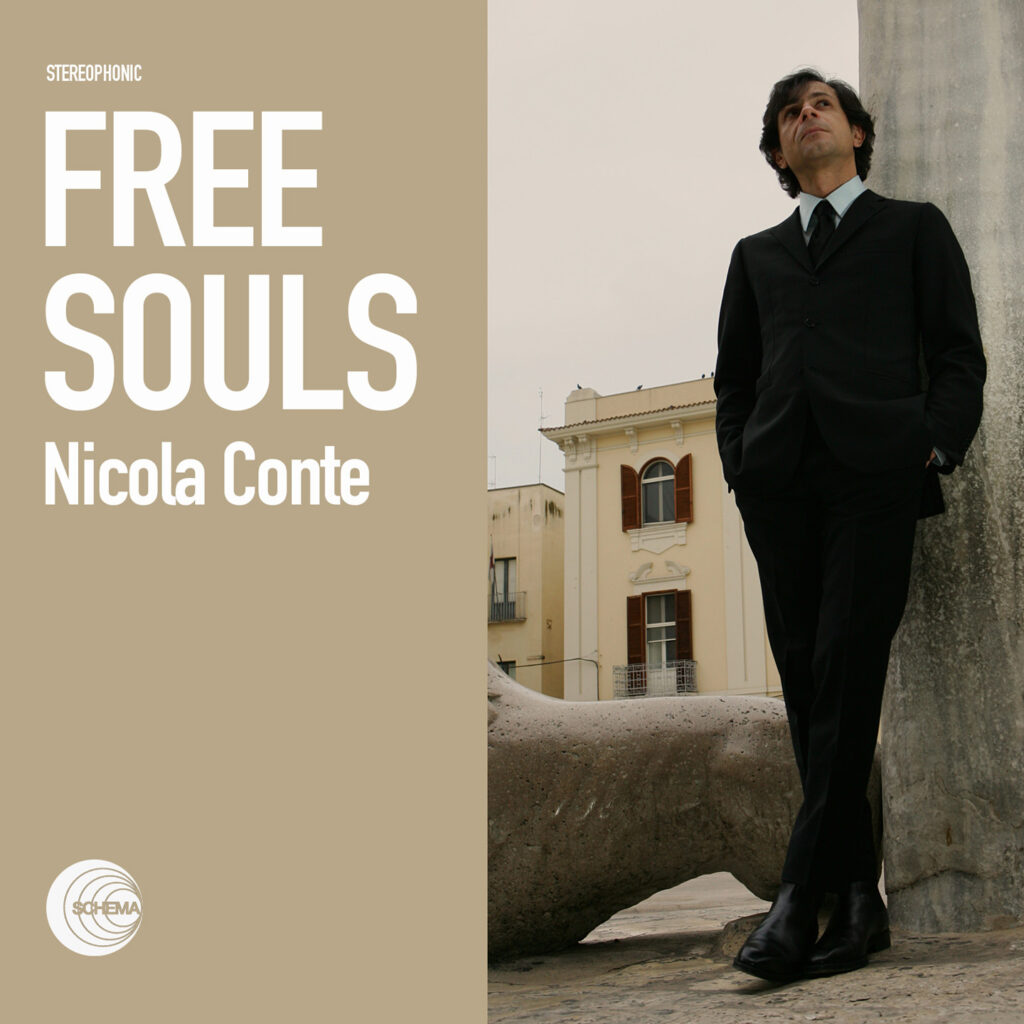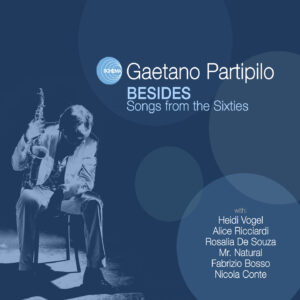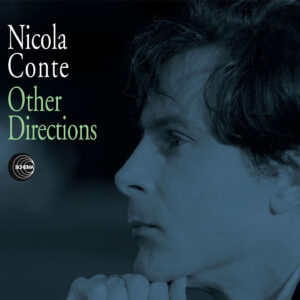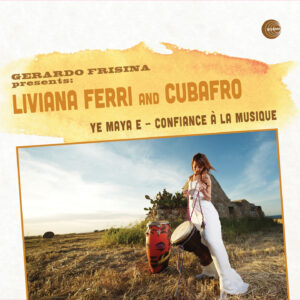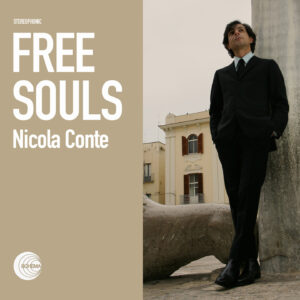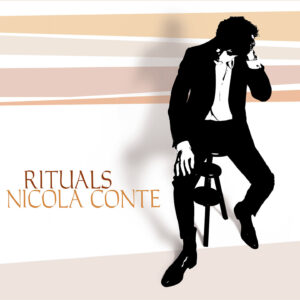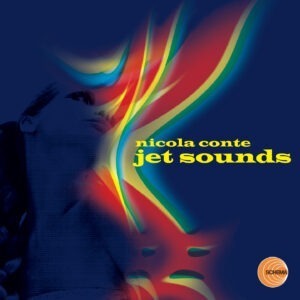NICOLA CONTE Free Souls 2 LP
€30.00
FORMATO 2 LP
CREDITS:
The Combo:
Magnus Lindgren – tenor sax and flutes
Francesco Lento – trumpet
Gaetano Partipilo – alto sax
Timo Lassy – baritone sax and flute on track 9
Pietro Lussu – piano and wurlitzer electric piano
Luca Alemanno – double bass and fender bass on track 3, 5, 6 and 9
Paolo Benedettini – double bass on track 1, 11 and 13
Teppo Mäkynen – drums on track 1, 3, 5, 6, 9, 11 and 13
Lorenzo Tucci – drums on track 2, 4, 7, 8, 10 and 12
Pietro Ciancaglini – double bass on track 2, 4, 7, 8, 10 and 12
Pierpaolo Bisogno – congas & percussion
And Friends:
Fabrizio Bosso – trumpet on track 12
Rosario Giuliani – alto sax on track 8 and 12
Greg Osby – alto sax on track 7
Logan Richardson – alto sax on track 13
Daniele Scannapieco – tenor sax on track 10
Flavio Boltro – trumpet on track 8
Michael Pinto – vibraphone on track 6, 7 and 9
Liviana Ferri – tambourine on track 5 and congas & percussion on track 12
Singers:
José James on track 2
Bridgette Amofah on track 3, 5 and 9
Melanie Charles on track 4 and 7
Marvin Parks on track 1, 8 and 12
Tasha’s World on track 6 and 10
Heidi Vogel on track 11
All background vocals by Bridgette, Melanie, Heidi, Tasha’s World, Kim Sanders on track 2 only
Produced and directed by Nicola Conte
Recorded in Bari at Sorriso Studio
Sound engineer: Tommy Cavalieri
Tracklist:
LP 1:
A1 Shades of Joy
A2 Goddess of the sea
A3 African Other blues
A4 Ahmad’s blues
B1 Free Souls
B2 Ode to billie joe
B3 Soul Revelation
B4 Sandalia Dela
LP 2:
A1 Baltimore Oriole
A2 Astral Rivers
A3 If I Should Lose You
A4 Sunrise
B1 A Prayer for Lateef
B2 Spirt of nature
B3 Uhuru
Descrizione
NICOLA CONTE
The early 60s had seen a change of direction in musical research, especially in Jazz: a turn into deepness. There was an urgent need to walk away from the research of an aesthetic dimension, in order to move towards a more intimate objective, closer to human feelings and spirituality.
“Horizontal” improvisations appeared to decrease, while “vertical” thrived: a movement directed to transcendence, God and the cosmos.
It was the time in which John Coltrane gave birth to that four-part suite which is still considered one of the 20th century masterpieces. A Love Supreme, was made up of four different moments of a monotheistic prayer whilst simultaneously reciting an immortal mantra. Deep – as we would call it today; spiritual and enchanting. This mantra brought closer to Jazz a whole generation who at that time was flirting with rock’n’roll – it was not Bitches Brew, which was a high profile operation, but conveyed with a certain spurious charm.
Deepness and consciousness had roots in something changing, something that involved proud and conscious musicians who were forging a new language, which would have completely changed music. Meanwhile, Funk and Soul literally exploded, anything but different expressions of a common feeling.
If we had to find a way to situate now Free Souls, in an age in which everything has been already played, from Rebetiko to Gamelan, from Rap to Kletzmer – an era where mannerism is background music for supermarkets – those are the times we should look at.
In those times deepness enfolded a way of conceiving music, especially Afro-American music which is naturally nourished by Jazz and its derivatives.
Is Soul the right word to describe this movement? So let’s use it without hesitation, because Soul’s mood is the only one which had been capable to enrich all the sounds that accompanied us throughout our days till now. Even the most mechanical Techno bars can transmit deepness when Soul is seeded within them.
“Free Souls” is pure Soul music when Marvin Parks’ voice softly embraces Shades of Joy melody and If I Should Lose You (a standard by Leo Robin and Ralph Rainger which became famous thanks to Hank Mobley’s version); is Africa when Tasha’s World and Bridgette Amofah are surrounded by the solos of Magnus Lindgren and Timo Lassy (both playing flute on Soul Revelation and Baltimore Oriole); is classy Jazz with the exceptional phrasing of jazzmen like Gaetano Partipilo (on Goddess Of The Sea and Ode To Billie Joe), Francesco Lento (one of the most promising Jazz trumpeter of these days, on Goddess Of The Sea and Ode To Billie Joe), Timo Lassy (on Free Souls), Greg Osby (on Ahmad’s Blues), Rosario Giuliani (on If I Should Lose You), Daniele Scannapieco (on Uhuru), Logan Richardson (on Sunrise, definitely a gem), of Fabrizio Bosso (on the beautiful African Other Blues with the spoken of Marvin Parks); and jazz again with the extraordinary vocals of Josè James on Goddess of The Sea.
The groove and rhythm section had been provided by Teppo Makynen, Lorenzo Tucci, Pierpaolo Bisogno, Paolo Benedettini, Luca Alemanno, Pietro Ciancaglini and Michael Pinto, the right line-up to highlight this great project.
Noteworthy is the contribution of Melanie Charles (Spirit Of Nature, Ahmad’s Blues, Live Your Life) and Heidi Vogel (from the Cinematic Orchestra’s combo on Sandalia Dela).
The patterns of this rich artistic web constructed by Nicola Conte reveal decades of listening sessions and deep musical beliefs.
An accomplished juggler when it comes to play with styles, capable to invent modern structures, Nicola got us used to his ability to blend harmonically different musical worlds and create cooperation between great musicians. Deepness is the added value of this album, something in between consciousness and spirituality. Nothing to share with futile trends, this record is a result of an urgent need to research in the depth of the soul and musical influences. I have known Nicola for too long to not understand that all this comes from the necessity to focus on an inexhaustible will to progress and desire for self-improvement, but most of all, from an unutterable passion for this marvellous universe called music.
Nicola Gaeta – author of the book “Bam, il Jazz oggi a New York”
Informazioni aggiuntive
| Marca |
|---|

